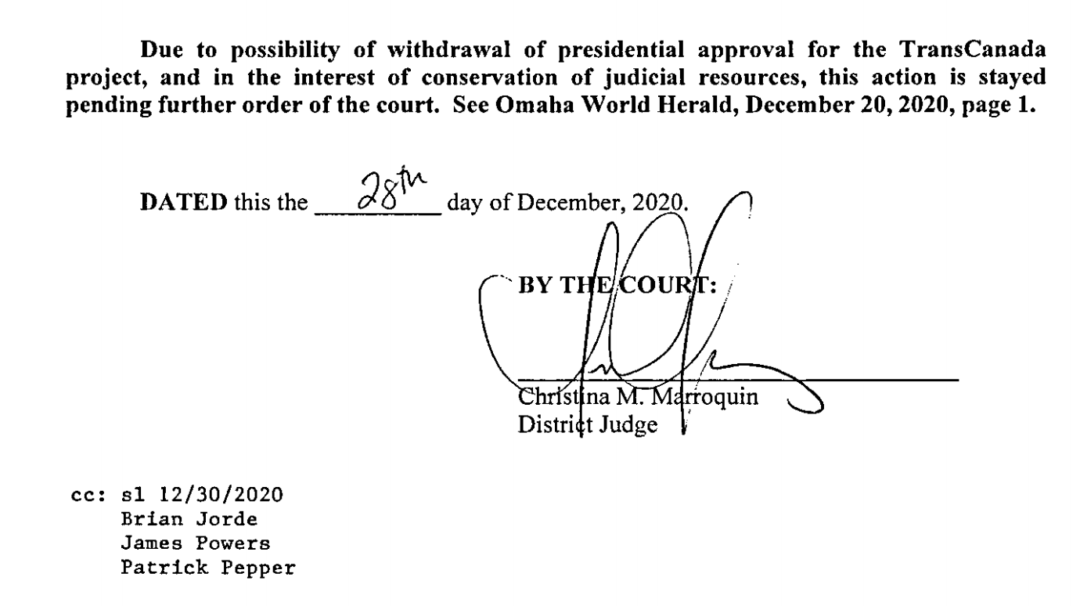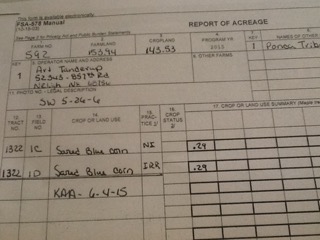





“There remain questions of material fact whether the condemnation actions filed herein follow the Commission’s approved Alternative Route, or whether there are substantive changes to the Alternative Route that require re-application to the Commission… Due to possibility of withdrawal of presidential approval for the TransCanada project, and in the interest of conservation of judicial resources, this action is stayed pending further order of the court. See Omaha World Herald, December 20, 2020, page 1.”
—Nebraska District Judge Christina M. Marroquin, writing in a decision on Dec. 28 in a case brought by landowners on the proposed KXL route in Seward County, NE
*UPDATE: A Nebraska judge issued a similar ruling in a fourth Nebraska jurisdiction (Butler County) on Dec. 31, halting all eminent domain condemnation proceedings until further notice and citing President-elect Joe Biden’s pledge to halt the project (See ruling embedded below). TransCanada’s efforts to seize land for the Keystone XL pipeline against the will of farmer and rancher landowners are now halted across Butler, Seward, and Jefferson counties in Nebraska.
Nebraska Courts Find Recent Changes to Keystone XL Pipeline Route May Require New State Approval
Farmers and ranchers challenging condemnation of their land for the pipeline via “eminent domain” in courts cite evidence of changes to route that under Nebraska law requires new route application at Public Service Commission
Seward, NE — Three Nebraska judges have ruled this month that recent changes to the proposed route for TransCanada’s (aka TC Energy) Keystone XL pipeline may require the Canadian corporation to file a new application with the state Public Service Commission (PSC), with two of the judges halting all current eminent domain condemnation proceedings by the company against Nebraska landowners until further notice — citing President-elect Joe Biden’s pledge to rescind permits for Keystone XL and stop the project once he takes office.
In a ruling posted Dec. 21, denying TransCanada’s motion to dismiss landowners’ claims in Jefferson County that the Keystone XL route has been substantially and materially changed since the PSC approval in 2017 such to require a new route application with the PSC, Nebraska District Judge Vicky L. Johnson wrote, “There remain questions of material fact whether the condemnation actions filed herein follow the Commission’s approved Alternative Route, or whether there are substantive changes to the Alternative Route that require re-application to the Commission.”
A ruling posted Dec. 28 by District Judge Christina M. Marroquin came to the same conclusion in Seward County, and both judges cited Biden’s pledge to kill the project in staying all pending condemnation cases against landowners: “Due to possibility of withdrawal of presidential approval for the TransCanada project, and in the interest of conservation of judicial resources, this action is stayed pending further order of the court.”
On Dec. 26 in Saline County, Judge Julie Smith also dismissed TransCanada’s motion to dismiss landowners’ claims of changes to the pipeline route that would require a new PSC application, writing, “…a question of fact exists whether TransCanada has substantially changed its route and whether TransCanada has followed the requirements of the Act. This includes notice and due process requirements with regard to these changes… If Plaintiffs and the other landowners are correct, TransCanada needs to reapply for the substantially changed route before initiating condemnation proceedings.”
If it is determined TransCanada has materially changed the pipeline route since the Public Service Commission’s approval in 2017, the company would be required to re-file a new application for a pipeline route with the Public Service Commission — and be back to “square one” in a six- to nine-month process that would include a new “intervenor” hearing where landowners and citizens could again voice their concerns and opposition to the Keystone XL project.
“Our firm represents the very best of Nebraska—hard working farmers and ranchers who want to protect the land and water for future generations. Pipeline corporations should be required to first provide direct notice to a landowner whose property they want to take via eminent domain, and should be required to obtain lawful approval of alterations in their pipeline routes. And if they don’t, their permits should be pulled,” stated landowners’ attorney Brian Jorde of Domina Law Group.
In the meantime, landowners on the proposed Keystone XL route in Seward and Jefferson counties at least have been given relief from TransCanada’s ongoing efforts during the coronavirus pandemic to seize their land in court via eminent domain for the pipeline.
Judge Johnson’s and Judge Marroquin’s citations of President-elect Biden’s pledge to kill the project in 22 days once he takes office on Inauguration Day should compel TransCanada to abandon its shameful harassment of landowners, and ongoing fruitless efforts to seek local permits, and engage in “pre-construction” activities that bring the added irresponsible risk of out-of-state pipeline workers into strained rural and Tribal communities during the coronavirus pandemic.
Among the evidence presented by landowners that was cited by all three judges in their rulings was an affidavit from farmer Art Tanderup, and other landowners who provided similar evidence of the proposed pipeline route having been substantially and materially changed since it was approved by the PSC in 2017. These landowners’ properties were initially subject to the Keystone XL pipeline route, but TransCanada quietly changed the route after it filed for route approval.
“Landowners continue to protect their property rights from a land grab that is not only greedy but unnecessary. The Keystone XL pipeline will never be built, and yet TransCanada continues to drag hardworking Nebraskans through years of financial burden, stated Jane Kleeb, founder of Bold Nebraska. “We fought hard to get a pipeline routing law in place, TransCanada is not following the spirit of that law, and we are happy to see the courts raise these similar questions.”
Order Re Motion for Summary Judgment (District Judge Christina Marroquin, Butler County)
Order Re Motion for Summary Judgment (District Judge Christina M. Marroquin)
Order Re Motion for Summary Judgment (District Judge Vicky Johnson)
Order Re Motion for Summary Judgment (District Judge Julie Smith)


Not coincidentally, the Tanderup farm near Neligh now also encompasses Ponca Nation land — land that was returned to the Tribe by the Tanderup family in 2018, and where since 2014, corn sacred to the Ponca people had been planted by hand and restored to its ancestral homeland for the first time in 137 years. The Tanderups registered the Sacred Ponca Corn now grown annually on the farm with the U.S.D.A.
The annual sacred corn-planting on the Tanderup farm, and return of land in the pipeline’s path to the Ponca Nation were actually noted by the U.S. State Department in its Final Supplemental Environmental Impact Statement for the Keystone XL project published in December 2019:





